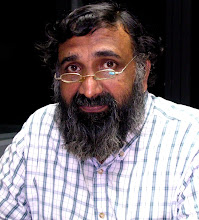
Finally, I have taken the plunge and created a blog for myself. As the name suggests, I plan to put my random thoughts here, on whatever I happen to be thinking about. It could be about science, literature, cinema, music, people, development issues, or something out of this world.
Having said that, let me say something that has always been close to my heart -- the way children are being brought up, the atmosphere they get in their own homes, and the mental or physical torture that parents often inflict upon these helpless individuals, knowingly or unknowingly. (This is particularly about the middle class families in Kerala, and possibly some other states in India. I do not have sufficient information about other countries to say anything about the situation there.) The simplest of these is the pressure modern parents, especially from the middle class, put on their children to earn high marks. This could sometimes become so powerful a pressure that the child eventually breaks down. The parents forget that scoring marks is not the most important thing in a person's life, and that even a talented child may not have the skills required to score high marks. The numerous suicides by students expecting their examination results that the media report every year is itself evidence for this. Thankfully, the change in the education system in Kerala, with grades replacing marks and ranks, can be hoped to reduce this burden to some extent.
Parents are capable of torturing their own children in many other ways. One example is the means adoopted to "discipline" them. This could mean a hundred things, including getting up, having their food and going to sleep at specified times, respecting elders, going out to play, watching television, whatever. Unlike in the case of scoring marks, many of these may actually be desirable, but the manner in which it is enforced often leads to the opposite effect. Adults often teach children undesirable behaviour patterns unknowingly. An example is the use of the stick to get the child to do something the adult wants. This effectively is equivalent to teaching the child that the use of physical threat is fully justified. And in today's nuclear families, the child often does not have recourse to consolation from any elder. In joint families, an uncle or aunt could act as a sink for the child's anguish.
I believe, a certain amount of serious counselling is essential before marriage. This should cover not only problems that may arise between husband and wife, but also child care and child psychology, including how to tackle problems that the parents may face as the child grows up. We often see an adult ignoring an accompanying child's questions or cries. This should never happen. The child's apprehensions or doubts may appear trivial to an adult, but they are very real to the child. The child should be given as much importance as any other individual -- after all, it is also an individual. Communication between parent and child should start right from the time the child is a baby. Parent should be willing to listen to what the child has to say, and to talk to it on equal terms and encourage it to communicate. Most of the problems between parents and children that we see today can be traced to a lack of communication between them.
